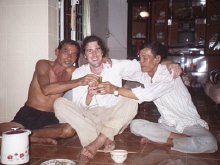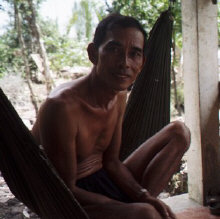I am the tallest person in this country – no doubt about it. Thoughts about gaining citizenship and trying to make the Olympic hoops squad are already running through my head. A cone-hatted woman eyes me from behind a bowl of noodle soup. Her penetrating gaze seems to say, “Eh, your jumper needs work.”
Here in Saigon, during a simple stroll, it seems I have achieved celebrity status. As I walk down these electric streets, uniformed school boys halt their sidewalk games and store owners stop their steady sweeping, beckoning to get a piece of me. Behold the Great White Hope! I can get used to this. Then I remember that people stare at freaks of nature as well and I let my shoulders slump, trying my best to fit in – a cowardly elephant in a sea of mice.
A few hours earlier, my hometown friend, Tuyen, greeted me at Tan Son Nhat Airport. Over the next four months, she would serve as travel confidante, interpreter and apothecary. In addition to Vietnamese language skills and a plethora of malaria pills, Tuyen has family in the Mekong Delta. I have known her immediate family – all of whom reside in the United States – for over fifteen years and I’ve finally memorized the names of her eight siblings.
Now I looked forward to getting acquainted with her extended family in Vietnam – though a family with nine children seems plenty extended – and also witnessing daily life in the Delta. Besides, a visit to her relatives would certainly mean great home-cooked meals (very important, considering my epicurean interests) and a postponement of our plans to ride upcountry in the Open Tour bus (the primary culprit behind the infamous tourist route in Vietnam). So we make a break from the stares of Saigon to test the waters at the riverside town of Giong Rieng.
As we head south, communication, or lack thereof, weighs on my mind, as I can’t speak a lick of her relatives’ native language and they can’t speak mine. Vietnamese – an inflectional, monosyllabic language – generally does not come easy to foreigners. (Walking into the ladies room at a rest stop, I finally come to terms with the fact that the “Learn Vietnamese Through Hypnosis” session was a waste of time.) To complicate matters, the Vietnamese have an elaborate system of addressing one another based on age, relationship and degree of formality. It all adds up to me making a big fool of myself. On the bright side, most of my interactions with the locals have been with the highly involved language of facial gestures and body gesticulations and in this respect, I am near fluent.


Drinking with family
![]()
![]()
From the moment I step off the boat in Giong Rieng, I am treated like family. Cau Ut (Baby Uncle) is the youngest of Tuyen’s mother’s siblings and serves as gracious host. He invites me to sit next to him cross-legged on his porch, which is a stone’s throw from the river. We do our best to communicate, with the help of Tuyen, as an extensive meal suddenly appears before us. The family congregates and a whirlwind of chopsticks descends upon the food.
This is the scene every night, the gathering of family and the enjoyment of such traditional dishes as banh xeo (duck egg omelets stuffed with fresh veggies), nem (pork on basil leaves), goi ga (shredded chicken salad), chao (rice porridge), tiet canh vit (duck innards in a blood broth) and an eye-opening meal of thit cho (dog meat).
In Vietnam, Rover serves to guard the house and occasionally, when a big celebration is in order, Rover rolls over in your stomach. No, it doesn’t taste like chicken. We also manage to go through a few bottles of Cau Ut’s homemade ruou de (rice wine), an effective complement to some of the strong flavors of the dishes and particularly effective as a social lubricant.
Thanks to repetition and rice wine, my Vietnamese comes along swiftly, mostly vocabulary related to food and drink. I pick up key phrases such as: qua no (I’m really full), ngon lam (It’s so tasty!) and nam muoi phan tram (fifty percent). The latest saying is a necessity with a single shot glass amongst a dozen male family members of drinking age, all of whom want to share a drink with the tall, pink kid before turning in for the night. When I notice clean bowls and empty bottles, I know that’s my personal cue to quietly retreat to bed. My head abuzz, I let down the mosquito net with care and drift off to the euphonic vibrations of nighttime creatures.
At dusk, I awake to a helicopter attack. The motors of long-tail boats blare throughout the day, their loud “WOP, WOP, WOP” recalling Hollywood war films. In the afternoon, we walk to the thriving, local market, where shouting vendors and scooter traffic add to the steady racket from the river. We pick up fruit and, on the way home, a throng of giggling children.
“What, you never seen a white guy before?”
After several games of rock, paper, scissors, I retire to the hammock. Rough life, I know. Eventually, the hotbed of activity along the river fades with the sun and tranquility arrives with night. And if my nose doesn’t deceive me, dinner is near.


Cau Ut
![]()
![]()
Cau Ut relaxes on the veranda, smoking a cigarette. He looks up at me and then pats the floor with an open hand. Well-versed in the language of hand gestures, I know to take a seat beside him. We silently take in the night before another feast unfolds. A short time later, family members gather in a circle, forming an inescapable boundary around the meal. We share food, drink and laughter in the open air, my apprehensions about communication dissolving. Though I am thousands of miles from home, I sit now with family.
It is our final night together. Cau Ut fills a glass with his moonshine and turns to me. He asks me if I will come back to visit him and I promise that I will. He makes the call for us to split the glass 50/50, swigs back his share and hands the glass to me. Noticing that he happened to shoot a tad more than half the glass, I say with a smile, “Bon muoi phan tram!” (Forty percent!) and knock back the remainder to the sound of laughter.
Despite the fact that there are considerable language barriers, aside from those cultural and historical, it is comforting to know that a smile is indeed universal and that we can find common ground in a glass of rice wine, about halfway down.